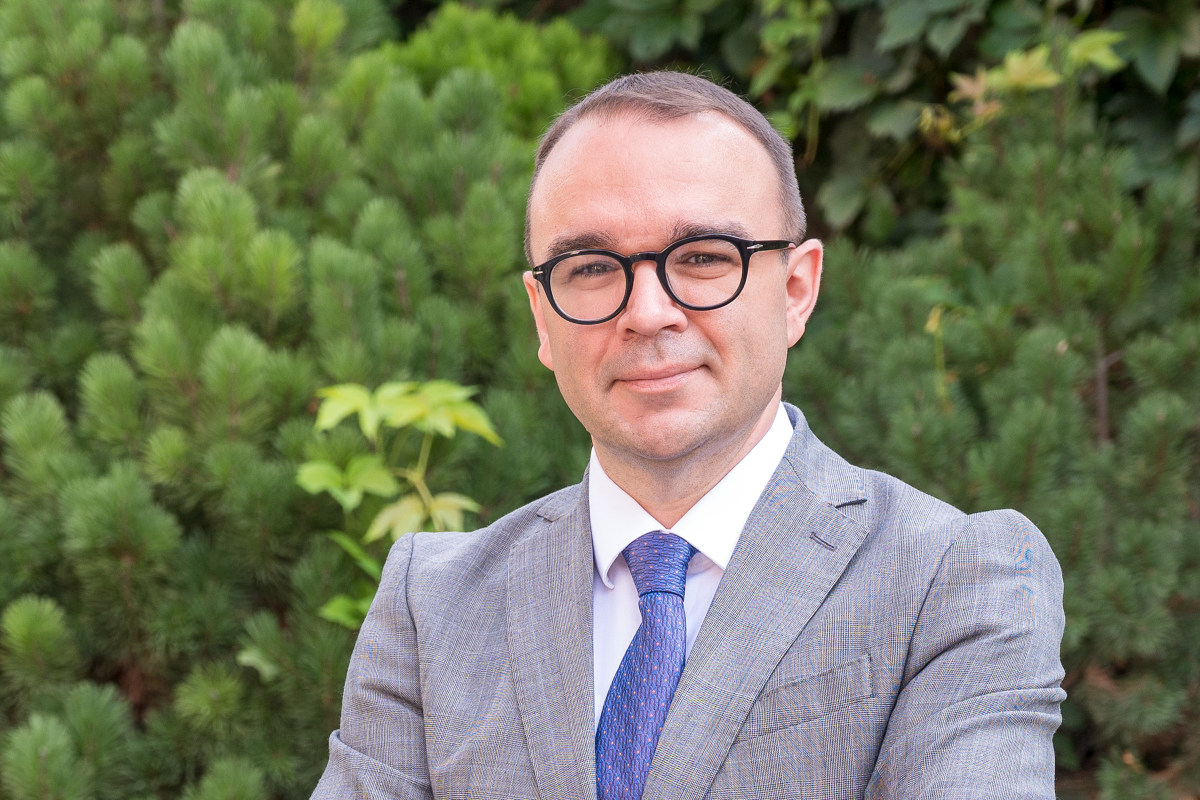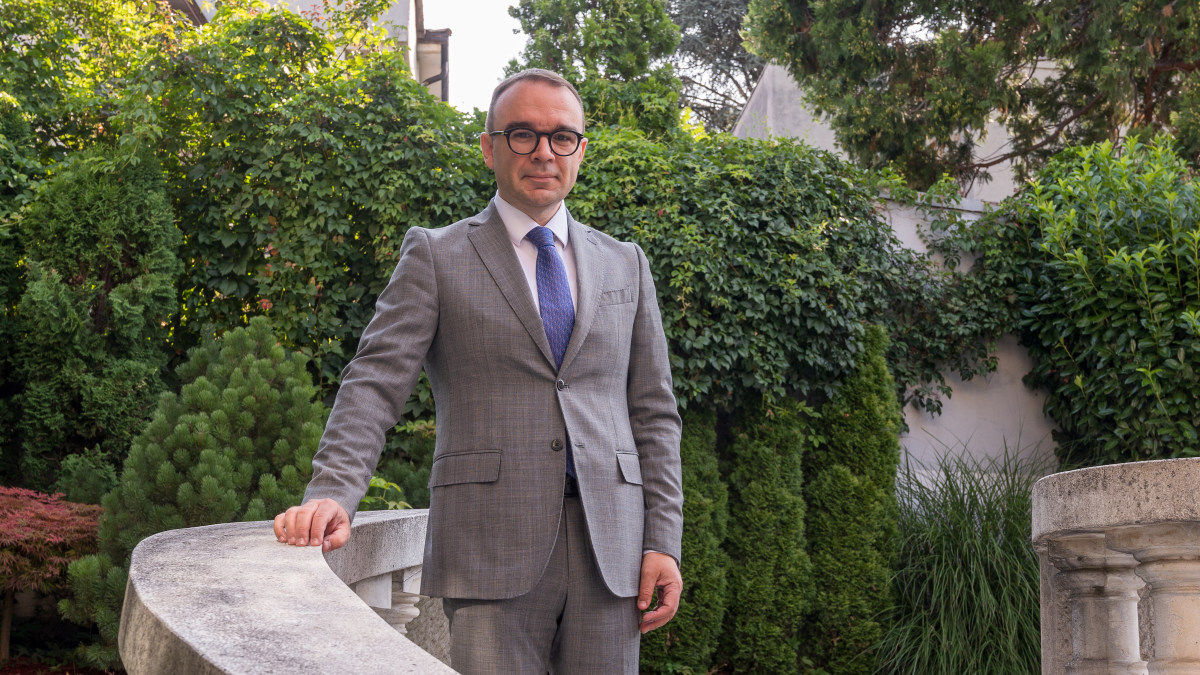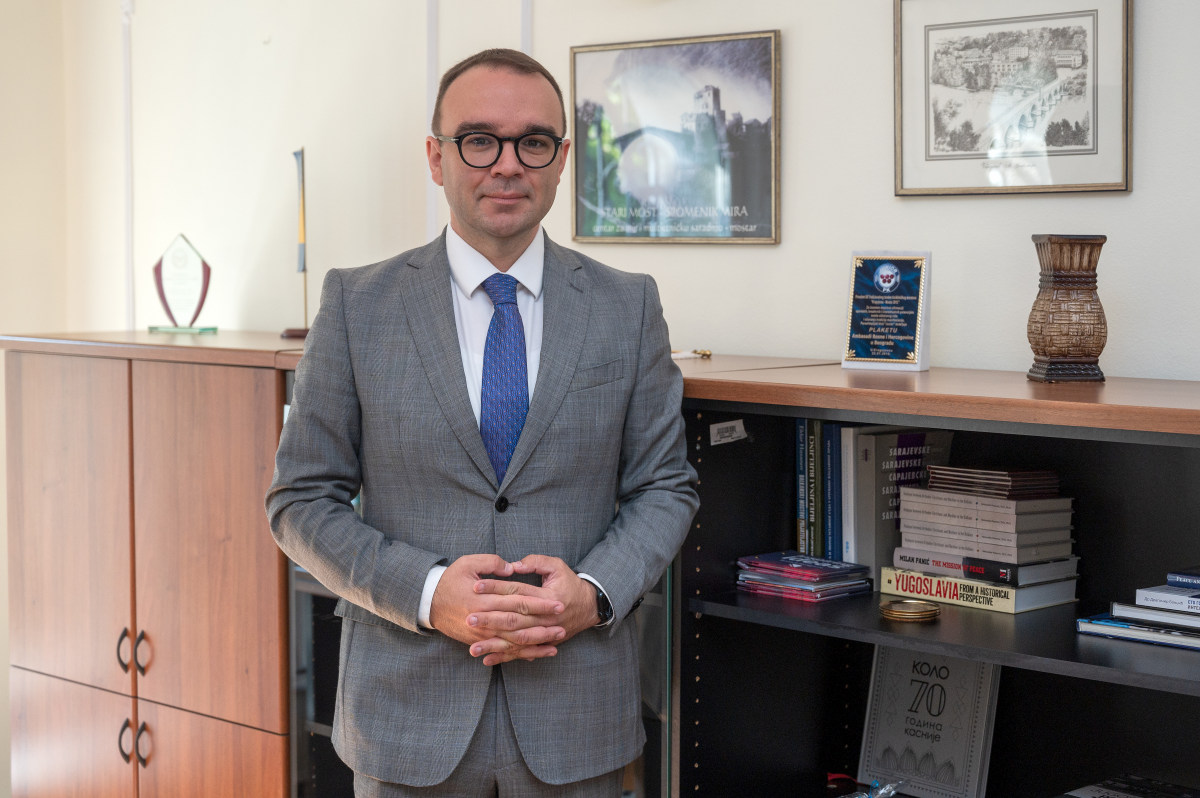The issue is that the political sphere is the focus of the media, creating the impression that the political disagreements among BiH’s leaders are so dominant in public discourse that no one else thinks about anything else (Interview by Robert Čoban)

While the citizens of the two countries and the entire region live in perfect harmony, official politics continuously creates conflicts and fails to reach agreements. What are the current relations between Serbia and BiH, and how can political differences be bridged? How does deeply divided Bosnia and Herzegovina function and implement its foreign policy when there are numerous disagreements between entities? Read all about it in the latest interview with the Ambassador of Bosnia and Herzegovina to Serbia, His Excellency Aleksandar Vranješ.
How do you manage to represent Bosnia and Herzegovina in a situation where the positions of the entity you come from (RS) often do not align with the positions of certain officials from the Federation of BiH and at the state level?
Like many other issues related to Bosnia and Herzegovina, this one is quite complicated. First, let me clarify that the focus here is not on the positions of the entities but on the decision-making process within the Presidency of BiH. The Constitution of Bosnia and Herzegovina stipulates that the Presidency of BiH is responsible for conducting foreign policy. Therefore, any foreign policy decision that the three members of the Presidency agree upon and adopt by consensus becomes binding for both the BiH Minister of Foreign Affairs and the ambassadors. This applies in the opposite direction as well. If there is no consensus and the Presidency has not made a decision, this means that BiH does not have a position, and the minister and ambassadors should remain abstained on the matter. The problem arises when abuses occur, and the Bosniak political stance is presented as the position of the entire BiH, which is simply not the case in a deeply divided state where the three constituent nations should be politically equal. But these abuses and the appropriation of the entire BiH by the Bosniak political elite have been a practice for decades, leading to even greater division in a very fragile and divided state community. For example, the Presidency of BiH never adopted a decision for BiH to join in drafting and later voting on the Resolution on Srebrenica, which was adopted by the UN General Assembly. This was a Bosniak abuse where the member of the Presidency of BiH, the Minister of Foreign Affairs of BiH, and the BiH Ambassador to the UN deceived partner states voting for the Resolution into believing it was a unified interest of BiH, not just the individual interest of one constituent nation. Ultimately, when you constantly have such abuses, it is clear that Serbian ambassadors to BiH will position themselves as representatives of the Serbian constituent nation and Republika Srpska, rather than of the entire BiH. But I emphasize that this is a defensive reaction to long-standing Bosniak abuses of the BiH foreign policy mechanism for the political interest of only one constituent nation.
Before Belgrade, you were the Ambassador of BiH in Zagreb. You spent a turbulent period there marked by the coronavirus pandemic and earthquakes in Croatia. What are your memories of that time?
The experience was quite unusual. Initially, I expected the mandate to be very relaxed given that I was going to a neighboring country and a familiar city, but COVID and the earthquakes significantly altered that picture. For example, at the beginning of my mandate, I met almost the entire diplomatic corps in Zagreb, but after several months of COVID restrictions, distancing, canceled receptions, and meetings, when things started to normalize, half of the ambassadors had changed. Ambassadors left without farewell receptions, new ones arrived without introductory visits, and when we finally returned to regular diplomatic activities, instead of old acquaintances, most receptions had new faces. Ultimately, this was no different in other countries.
Indicators are confirming the thesis that young people are leaving, based on the view that the unstable economic and political situation in BiH increases uncertainty
Regarding activities, I am proud to say that I facilitated financial assistance from Republika Srpska to the Serbian community in Croatia according to the available resources. The RS Government and President Dodik donated 10 houses to families affected by the earthquake in Banija, provided funds for the reconstruction of the Orthodox Cathedral in Zagreb, financed the construction of an old school building within the Jasenovac monastery, etc.
As for bilateral relations with Croatia, we had very correct communication. During this time, the primary issue in our relations was the amendment of the BiH Electoral Law to prevent further marginalization and majorization of the Croatian constituent nation in BiH, which Zagreb was particularly interested in. Unfortunately, this issue remains unresolved to this day as the Bosniak political elite simply does not allow for a mechanism in the Electoral Law to prevent Bosniaks from electing a Croatian member of the Presidency by outvoting Croatian voters, so this matter is still open.
Another important issue during my mandate in Zagreb, which is still unresolved, concerns Croatia’s intention to build a radioactive waste facility near the border with BiH, in the watershed of the protected Una River. Unfortunately, this issue has also not been resolved, which only highlights how slowly processes for resolving open issues move in this region.
As a young person and a parent, how do you view the future for upcoming generations in BiH, given that statistics show this part of the Western Balkans is emptying even faster than others with similar negative trends?
Indicators are confirming the thesis that young people are leaving, based on the view that the unstable economic and political situation in BiH increases uncertainty, which in turn leads to decisions to leave BiH in search of safer and more promising opportunities in other countries. And I am sure that this assessment, which we often hear in the media, is largely accurate. However, in my conversations within the diplomatic corps, when this topic comes up, I like to broaden my perspective on this problem from another angle. Doesn’t it seem a bit hypocritical if one country criticizes the authorities in BiH for doing nothing to prevent the emigration of young people, while at the same time, that same country keeps its doors wide open to our citizens, offering them many benefits and opportunities to come to their country to compensate for their labor shortages? So, when I find myself in such discussions, I usually ask those ambassadors why they don’t close the doors to our citizens, and they won’t be able to leave; they will stay in BiH. It sounds simplistic, but how can the economy of BiH compete with the salaries offered to our citizens in some EU member states?
Not all citizens of BiH are so burdened by political divisions and misunderstandings
Imagine a situation where our talented student completes medical school on a state scholarship, then receives further training and specialization funded by public funds, and as a qualified doctor is employed in our hospitals with a salary of, say, 1500 EUR, while some developed EU countries offer an initial salary of 3000 EUR. It turns out that we are effectively funding the healthcare systems of developed countries. Typically, ambassadors respond that their specialists also go to other countries for better salaries. In other words, some embassies act as scouts for experts and workforce from BiH and then reproach us for allowing young people to leave. It is completely paradoxical. Of course, I agree that we need to improve overall economic stability, which is in the hands of the political elites in BiH, to provide a better life for all citizens. But even when that happens, it will be difficult to compete with the “outrageous offers” coming from the EU.
What are your communications like within the diplomatic community in Belgrade, which “Diplomacy & Commerce” regularly monitors? How does this compare to the diplomatic scene in Sarajevo and Zagreb? Which diplomats in Belgrade do you remember the most?
As I mentioned, most of my mandate in Zagreb was affected by COVID restrictions, so it’s difficult for me to make a comparison with Belgrade. In any case, diplomatic life in Belgrade is very intense, which is not surprising considering its long tradition. It has been exactly one year since I presented my credentials to President Vučić, and I can say that I have managed to meet a large number of colleagues from the diplomatic corps and establish good communication. If I were to highlight a few diplomats with whom I have communication, I would say that I always enjoy meeting with the ambassadors of Hungary, the Russian Federation, Slovenia, Greece, Cyprus, Belgium, Turkey, the Czech Republic (who recently left Belgrade), Slovakia, Poland, North Macedonia, and many others. I always appreciate exchanging views with them and at least partially trying to clarify the complex system and relationships in BiH.

Colleague Ljiljana Smajlović wrote in the editorial of “Nedeljnik” last year: “If we ever reconcile, it won’t be in the summer,” alluding to the fact that tensions between Bosniaks and Serbs rise every July over the anniversary of the Srebrenica massacre in 1995, and in August between Croats and Bosniaks over the anniversary of Operation Storm in 1995. How can we reach a situation where, like other European nations, we spend July and August only discussing vacation plans and how people enjoyed their holidays?
If we focus on the political sphere, you are right. However, I would emphasize that not all citizens of BiH are so burdened by political divisions and misunderstandings. Most of them, like in other countries, think about vacations in July and August, and there is not much difference compared to people in the region and beyond. The issue is that the political sphere is the focus of the media, creating the impression that the political disagreements among BiH’s leaders are so dominant in public discourse that no one else thinks about anything else. Of course, this is not the case, and ordinary people primarily focus on everyday life. Politics is present in daily life, but not nearly as much as we might perceive from the media or social networks.
When we return to the political sphere and the recurring disagreements year after year, we need to consider a few more perspectives. During the civil war in BiH, leading authorities on international relations in the US believed that BiH could not be constituted as a state and advocated for a division rather than the creation of a unified state. For example, Henry Kissinger stated two months before the signing of the Dayton Peace Agreement in 1995: “There is no Bosnian language, there is no Bosnian culture. Bosnia is an administrative unit consisting of Serbs, Croats, and Bosniaks, artificially created in the former Yugoslavia, which Western powers foolishly recognized as a state (…) If you look at Serbian history, for 600 years they fought not to be dominated by Muslims (…) So I believe what we should do is create a Muslim state or recognize a Muslim state, allow other nationalities to become independent or join Croatia and Serbia, depending on the case, rather than getting involved in a Balkan war that cannot end, even if we win it.” Nearly thirty years later, we can question whether Kissinger was right and why the concept he advocated, along with John Mearsheimer, Stephen Van Evera, Robert Pape, and others, was rejected outright in favor of creating a state at any cost.
Bosnia and Herzegovina is one of Serbia’s main foreign trade partners
Unfortunately, their diagnosis was not accepted, and the process of creating a state involved freezing the conflict, often bypassing the provisions of the Dayton Agreement and creating a black-and-white image of good and bad actors from Bosnia and Herzegovina. This has led to significant divisions, which also manifest in the domain of commemorations for war victims. For example, today no one has been criminally charged for the killing of 3,267 Serbian civilians from the Srebrenica and Bratunac regions from 1992 to 1995, while the suffering of Bosniak soldiers in Srebrenica in July 1995 is proclaimed as the symbol of the civil war. How can the practice of double standards and different valuations of victims lead to reconciliation? And then when the EU Delegation in BiH went to Bratunac last month to pay tribute to these innocent Serbian civilian victims, it was met with numerous attacks from the Bosniak political elite. According to Bosniak narratives, the international community should not, even three decades after the war, pay tribute to Serbian civilian victims of the civil war. Given such a situation, it is not surprising that every summer is quite turbulent. Someone has decided that mothers who lost their sons in the war are not equal in their grief, and this does not contribute to reconciliation.
Where do you see the underutilized potential for improving economic cooperation between BiH and Serbia?
Bosnia and Herzegovina is one of Serbia’s main foreign trade partners. The trade exchange is already at a high level, but of course, there is still room for improving economic cooperation. Unfortunately, politics has also interfered in this aspect, so efforts are being made from Sarajevo to block major projects such as the construction of the Buk Bijela hydropower plant, which represents a joint energy project between the electric utilities of the Republic of Srpska and Serbia, valued at around 250 million euros. Sadly, even such an important project faces political blockades in Sarajevo. In any case, the Republic of Serbia has shown readiness to expand the scope of economic cooperation with BiH, and we hope to find a way to ensure that political disagreements in BiH do not affect the enhancement of economic cooperation with any country.
